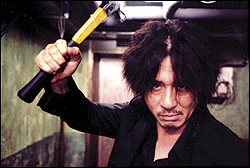Those squeamish about seeing this violent and surprisingly powerful South Korean psychological thriller should remember what Oedipus did to his own eyes. Blood and tragedy always go together. Melting clocks in the credit sequence to Oldboy (which opens Friday, April 22, at the Egyptian) nod to Spellbound and Hitchcock, but I’d compare the movie more to Vertigo: The obsession with unraveling a mystery leads to terrible self-knowledge. Director Park Chanwook (Sympathy for Mr. Vengeance) understands this dramatic rule as clearly as Sophocles.
Not that there’s anything initially classical or heroic about Oh Dae-su (Choi Min-sik), whom we meet after a bender. He behaves like a drunken fool at the police station; the cops are glad to be rid of him when chubby pal Joo-hwan arrives to bail him out. Out in the rain, however, where a purple umbrella with a peculiar pattern stands sentinel, Joo-hwan loses track of his friend, who was calling home to his wife and young daughter.
For Oh, the next 15 years pass in a blur. He narrates from his prison diary, written in a cell that seems as drab and spirit-crushing as your average Motel 6. He’s fed and provided with TV, but he’s also regularly drugged and hypnotized. (His wife gets murdered in the interim—which leads, sorry, nowhere.) Who put him in this infernal place, and why? “I’ve sinned so much,” Oh concedes, but he can’t recall anything particularly damning. One thing’s for sure: Somebody really has a grudge against him. Uncertain of the object of his vengeance, he pounds his bare fists into the walls for 15 years, so he’ll at least be ready with the instruments of revenge.
The standard American movie formula of a wronged man looking for payback is always easy to follow: You’ve got the hero, the bad guy, and a victim between them—most often a woman. Oldboy basically fits that outline, then deviates wildly and often confusingly, with lots of flashbacks and hallucinations. You could compare the early penal section to the British TV show The Prisoner: Some mysterious party is messing with Oh’s head, and he can’t be sure what to believe or whom to trust—in or out of his cell. When he’s finally released, stumbling onto a rooftop suicide attempt, he strokes the would-be jumper’s face with loving intensity. Oh is starved for physical contact, desperate to tell his tale. He couldn’t masturbate successfully to TV music videos in jail, so he’s got a huge surge of passions waiting for release.
On the outside, however, Oh is confronted with “life in a bigger prison.” A bum gives him a cell phone and wallet full of cash; his unknown jailor is still manipulating him. The cell phone rings. To know the cause of his torment, “Review your whole lifetime,” he’s told. Oh follows his appetites to a sushi bar, where he eats a squid with tentacles still writhing. (Yes, it’s one of the grossest yet funniest scenes of the year; the guy wants viscerally to live, and he wants live food.) The friendly young sushi chef, Mido (Gang Hye-jung), looks astonished, then takes him home with her. There’s a strong connection, but they don’t become lovers right away.
You’re on your own from this point forward. I don’t want to give away too much more about Oldboy, other than to add that the penthouse-dwelling rich villain is Lee Woo-jin (Yoo Ji-tae), who essentially gives Oh a choice: Kill me now, or wait and discover the cause of the bad blood between us. So Oh becomes a detective following the clues to Lee, who hints that Oh “talks too much”—hmmm, what could that mean? Using his prison-deprived yet sharpened senses, Oh samples every dumpling shop in Seoul until finding the restaurant that delivered to his private jail. (Revenge is a dish best served deep-fried.) He tests his 15 years of physical training by attacking a gang of prison guards. He uses a claw hammer for tooth extractions. He also does a lot of e-mailing and Web surfing—OK, even foreign movies suffer from this dull phenomenon—at the cyber cafe of his helpful old buddy Joo-hwan. Lee delivers messages like “It’s a game” and “You are the monster that I created.” Purple gift boxes with a certain telltale pattern keep popping up with very disturbing contents.
Oldboy does have its problems and incoherent patches. Mido’s odd attachment to the volatile Oh is finally explained, but the giant ant she once saw on the subway is not. Oh only hallucinates ants crawling from his flesh, but he carries a variety of electronic bugs that allow Lee to monitor his investigation—there’s a ridiculous aspect of The Game and The Truman Show to his trials. Lee also spends much time showering and wandering naked through his evil-genius lair (which features a faceted cubic walk-in closet Helmut Lang or a Bond villain would envy). It’s one of those movies where you worry, “Please don’t tell me this is all going to be a dream sequence where the hero wakes up back on his jail cot.”
It’s not, and despite its excesses, Oldboy follows in the tradition of Hitchcock (perhaps with a detour through David Lynch–land). Like Jimmy Stewart in Vertigo, Choi gradually goes bonkers during his quest; he’s so intent on one mystery that he overlooks clues closer to home. He’s got a ravenous, powerhouse quality reminiscent of Klaus Kinski; you often can’t tell whether he’s grimacing or smiling, crying or laughing. Prison splits him in two. Even when finally reduced to the level of an animal, Oh retains his human qualities, which is to say— hunger, debasement, and loss.








